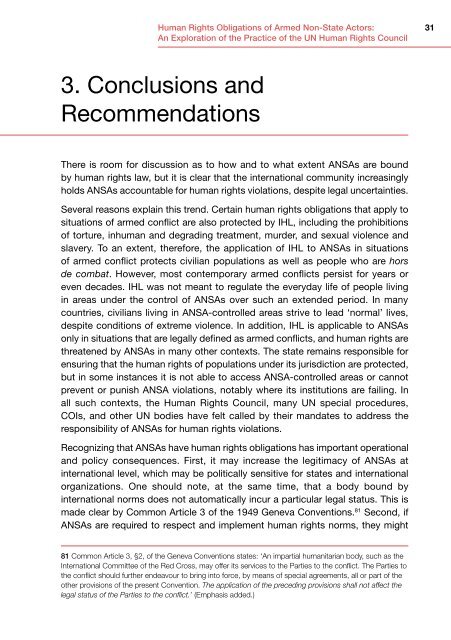InBrief7_web
InBrief7_web
InBrief7_web
Create successful ePaper yourself
Turn your PDF publications into a flip-book with our unique Google optimized e-Paper software.
Human Rights Obligations of Armed Non-State Actors:<br />
An Exploration of the Practice of the UN Human Rights Council<br />
31<br />
3. Conclusions and<br />
Recommendations<br />
There is room for discussion as to how and to what extent ANSAs are bound<br />
by human rights law, but it is clear that the international community increasingly<br />
holds ANSAs accountable for human rights violations, despite legal uncertainties.<br />
Several reasons explain this trend. Certain human rights obligations that apply to<br />
situations of armed conflict are also protected by IHL, including the prohibitions<br />
of torture, inhuman and degrading treatment, murder, and sexual violence and<br />
slavery. To an extent, therefore, the application of IHL to ANSAs in situations<br />
of armed conflict protects civilian populations as well as people who are hors<br />
de combat. However, most contemporary armed conflicts persist for years or<br />
even decades. IHL was not meant to regulate the everyday life of people living<br />
in areas under the control of ANSAs over such an extended period. In many<br />
countries, civilians living in ANSA-controlled areas strive to lead ‘normal’ lives,<br />
despite conditions of extreme violence. In addition, IHL is applicable to ANSAs<br />
only in situations that are legally defined as armed conflicts, and human rights are<br />
threatened by ANSAs in many other contexts. The state remains responsible for<br />
ensuring that the human rights of populations under its jurisdiction are protected,<br />
but in some instances it is not able to access ANSA-controlled areas or cannot<br />
prevent or punish ANSA violations, notably where its institutions are failing. In<br />
all such contexts, the Human Rights Council, many UN special procedures,<br />
COIs, and other UN bodies have felt called by their mandates to address the<br />
responsibility of ANSAs for human rights violations.<br />
Recognizing that ANSAs have human rights obligations has important operational<br />
and policy consequences. First, it may increase the legitimacy of ANSAs at<br />
international level, which may be politically sensitive for states and international<br />
organizations. One should note, at the same time, that a body bound by<br />
international norms does not automatically incur a particular legal status. This is<br />
made clear by Common Article 3 of the 1949 Geneva Conventions. 81 Second, if<br />
ANSAs are required to respect and implement human rights norms, they might<br />
81 Common Article 3, §2, of the Geneva Conventions states: ‘An impartial humanitarian body, such as the<br />
International Committee of the Red Cross, may offer its services to the Parties to the conflict. The Parties to<br />
the conflict should further endeavour to bring into force, by means of special agreements, all or part of the<br />
other provisions of the present Convention. The application of the preceding provisions shall not affect the<br />
legal status of the Parties to the conflict.’ (Emphasis added.)


